听力文字材料
- 格式:doc
- 大小:38.00 KB
- 文档页数:4
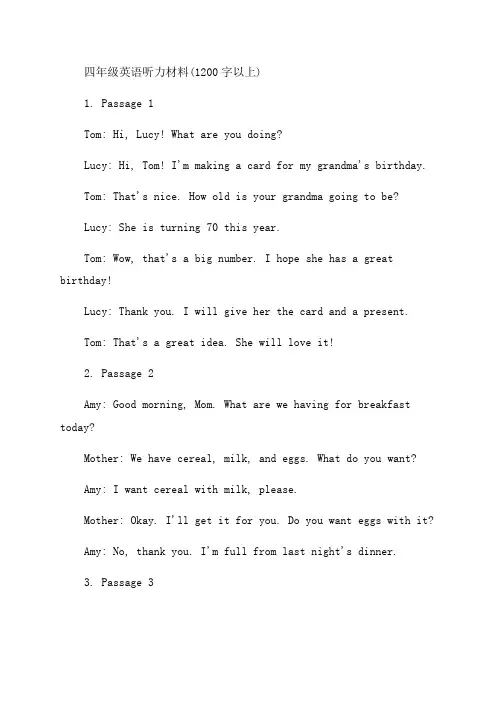
四年级英语听力材料(1200字以上)1. Passage 1Tom: Hi, Lucy! What are you doing?Lucy: Hi, Tom! I'm making a card for my grandma's birthday.Tom: That's nice. How old is your grandma going to be?Lucy: She is turning 70 this year.Tom: Wow, that's a big number. I hope she has a great birthday!Lucy: Thank you. I will give her the card and a present.Tom: That's a great idea. She will love it!2. Passage 2Amy: Good morning, Mom. What are we having for breakfast today?Mother: We have cereal, milk, and eggs. What do you want?Amy: I want cereal with milk, please.Mother: Okay. I'll get it for you. Do you want eggs with it?Amy: No, thank you. I'm full from last night's dinner.3. Passage 3Teacher: Class, we're going on a field trip tomorrow. We're going to the zoo.Tom: That's great! I love the zoo.Lucy: Me too! I want to see the lions and tigers.Teacher: We'll see all the animals. Make sure to bring your hats and lunch.Teacher: We'll meet at 8:30 a.m. Don't be late!4. Passage 4Lily: I don't want to go swimming, Dad. I'm scared of water.Father: Don't worry, Lily. I'll stay with you in the pool.It'll be fun.Lily: Okay, I'll try. But please don't let go of my hand.Father: I promise, Lily. Let's go have some fun in the water!5. Passage 5Kate: Hi, Mike. Do you want to play soccer with us after school?Mike: I can't today, Kate. I have piano lessons.Mike: Sure! I love playing soccer.Kate: Great. See you tomorrow!。
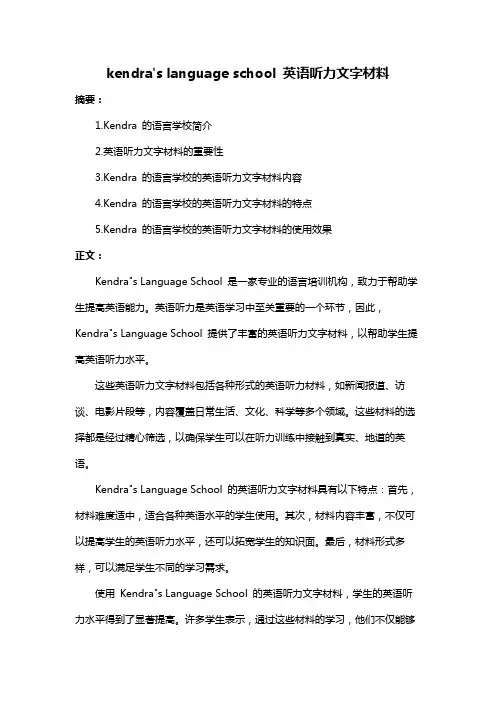
kendra's language school 英语听力文字材料
摘要:
1.Kendra 的语言学校简介
2.英语听力文字材料的重要性
3.Kendra 的语言学校的英语听力文字材料内容
4.Kendra 的语言学校的英语听力文字材料的特点
5.Kendra 的语言学校的英语听力文字材料的使用效果
正文:
Kendra"s Language School 是一家专业的语言培训机构,致力于帮助学生提高英语能力。
英语听力是英语学习中至关重要的一个环节,因此,Kendra"s Language School 提供了丰富的英语听力文字材料,以帮助学生提高英语听力水平。
这些英语听力文字材料包括各种形式的英语听力材料,如新闻报道、访谈、电影片段等,内容覆盖日常生活、文化、科学等多个领域。
这些材料的选择都是经过精心筛选,以确保学生可以在听力训练中接触到真实、地道的英语。
Kendra"s Language School 的英语听力文字材料具有以下特点:首先,材料难度适中,适合各种英语水平的学生使用。
其次,材料内容丰富,不仅可以提高学生的英语听力水平,还可以拓宽学生的知识面。
最后,材料形式多样,可以满足学生不同的学习需求。
使用Kendra"s Language School 的英语听力文字材料,学生的英语听力水平得到了显著提高。
许多学生表示,通过这些材料的学习,他们不仅能够
更好地理解英语,还能够更自信地使用英语进行交流。
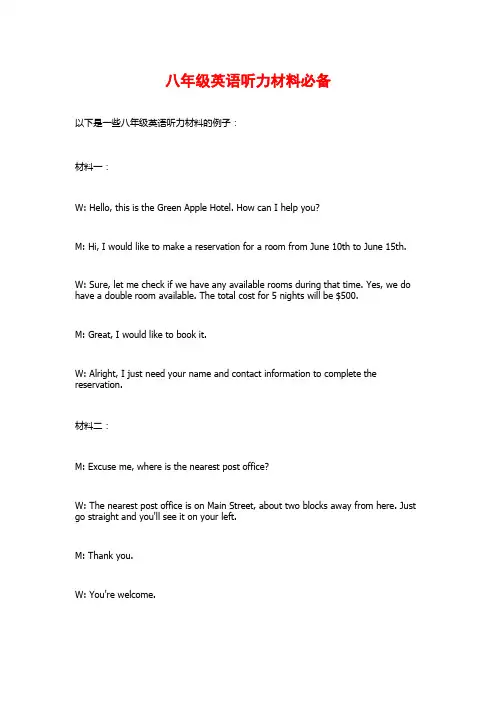
八年级英语听力材料必备以下是一些八年级英语听力材料的例子:材料一:W: Hello, this is the Green Apple Hotel. How can I help you?M: Hi, I would like to make a reservation for a room from June 10th to June 15th.W: Sure, let me check if we have any available rooms during that time. Yes, we do have a double room available. The total cost for 5 nights will be $500.M: Great, I would like to book it.W: Alright, I just need your name and contact information to complete the reservation.材料二:M: Excuse me, where is the nearest post office?W: The nearest post office is on Main Street, about two blocks away from here. Just go straight and you'll see it on your left.M: Thank you.W: You're welcome.材料三:M: Can you believe it? We only have one week left until the final exam!W: I know, it feels like the semester just started yesterday. I still have so much to study.M: Yeah, me too. I have to review all the chapters and do some practice questions.W: We should form a study group and help each other out.M: That's a great idea. Let's do it!以上是一些典型的八年级英语听力材料,希望对你有帮助。
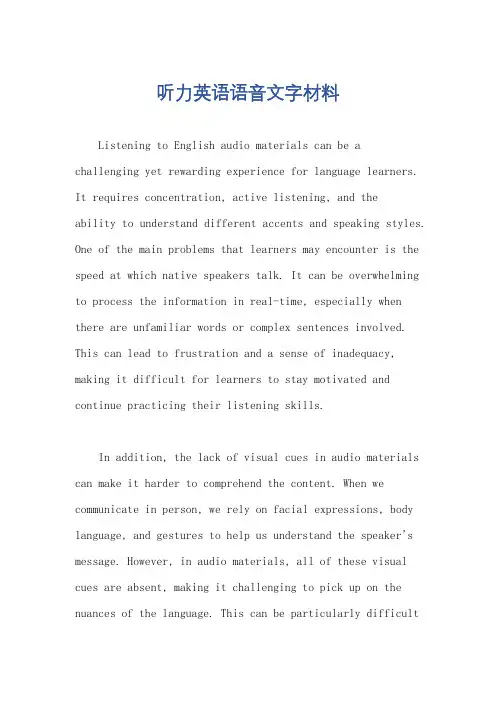
听力英语语音文字材料Listening to English audio materials can be a challenging yet rewarding experience for language learners. It requires concentration, active listening, and theability to understand different accents and speaking styles. One of the main problems that learners may encounter is the speed at which native speakers talk. It can be overwhelming to process the information in real-time, especially when there are unfamiliar words or complex sentences involved. This can lead to frustration and a sense of inadequacy, making it difficult for learners to stay motivated and continue practicing their listening skills.In addition, the lack of visual cues in audio materials can make it harder to comprehend the content. When we communicate in person, we rely on facial expressions, body language, and gestures to help us understand the speaker's message. However, in audio materials, all of these visual cues are absent, making it challenging to pick up on the nuances of the language. This can be particularly difficultfor learners who are used to relying on visual aids to understand and process information.Furthermore, the variety of accents and dialects in English can pose a significant challenge for language learners. English is spoken in many different countries around the world, and each region has its own unique accent and pronunciation. For example, the British accent is quite different from the American accent, and within the United States, there are also regional variations in pronunciation. This can make it difficult for learners to understand and familiarize themselves with the different ways English is spoken, leading to confusion and a lack of confidence in their listening abilities.Moreover, the use of idioms, slang, and cultural references in English audio materials can be a barrier for language learners. Native speakers often use colloquial expressions and informal language in their everyday conversations, which may not be familiar to non-native speakers. This can make it challenging to grasp theintended meaning of the message and can lead tomisunderstandings. Additionally, cultural references and jokes may not translate directly, further complicating the listening experience for language learners.On a positive note, listening to English audio materials can greatly benefit language learners by improving their listening comprehension skills, vocabulary, and pronunciation. With regular practice, learners can become more accustomed to the speed at which native speakers talk and can start to pick up on the nuances of the language. Exposure to different accents and dialects can also help learners become more versatile and adaptable in their listening abilities, making it easier for them to understand a wide range of English speakers.In conclusion, while listening to English audio materials can present challenges for language learners, it is an essential skill to develop for overall language proficiency. By acknowledging the difficulties and actively working to improve listening skills, learners can overcome these obstacles and become more confident and proficient in their English language abilities. With dedication andperseverance, the rewards of improved listening comprehension and communication skills will far outweigh the initial challenges.。
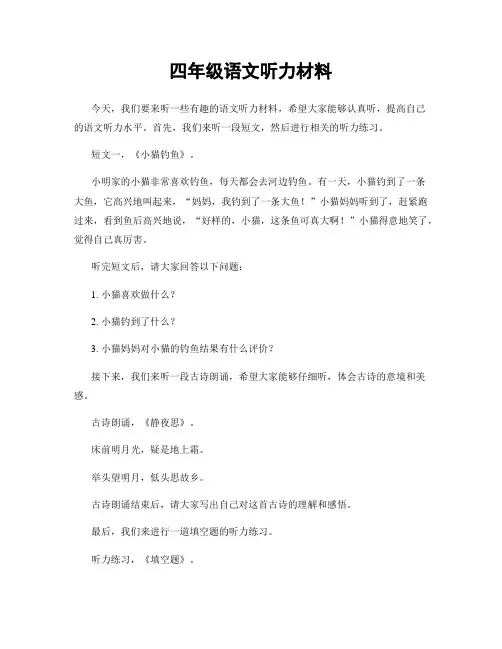
四年级语文听力材料今天,我们要来听一些有趣的语文听力材料,希望大家能够认真听,提高自己的语文听力水平。
首先,我们来听一段短文,然后进行相关的听力练习。
短文一,《小猫钓鱼》。
小明家的小猫非常喜欢钓鱼,每天都会去河边钓鱼。
有一天,小猫钓到了一条大鱼,它高兴地叫起来,“妈妈,我钓到了一条大鱼!”小猫妈妈听到了,赶紧跑过来,看到鱼后高兴地说,“好样的,小猫,这条鱼可真大啊!”小猫得意地笑了,觉得自己真厉害。
听完短文后,请大家回答以下问题:1. 小猫喜欢做什么?2. 小猫钓到了什么?3. 小猫妈妈对小猫的钓鱼结果有什么评价?接下来,我们来听一段古诗朗诵,希望大家能够仔细听,体会古诗的意境和美感。
古诗朗诵,《静夜思》。
床前明月光,疑是地上霜。
举头望明月,低头思故乡。
古诗朗诵结束后,请大家写出自己对这首古诗的理解和感悟。
最后,我们来进行一道填空题的听力练习。
听力练习,《填空题》。
请听一段描述动物的短文,然后根据短文内容填空。
短文内容,小松鼠是一种很可爱的_______,它们喜欢在树上跳来跳去,搜寻美味的_______吃。
小松鼠的尾巴又长又_______,非常灵活,可以帮助它们保持平衡。
小松鼠的耳朵又大又_______,可以听到很远的声音。
小松鼠的爪子很_______,可以轻松地攀爬树木。
听完短文后,请大家完成填空题,并核对答案。
通过以上听力材料,相信大家对语文听力有了一定的提高。
希望大家能够多多练习,提高自己的语文听力水平。
谢谢大家的参与,我们下次再见!。
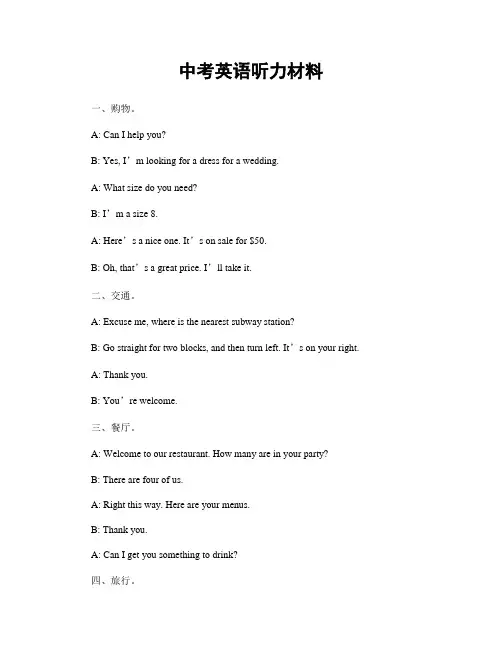
中考英语听力材料一、购物。
A: Can I help you?B: Yes, I’m looking for a dress for a wedding.A: What size do you need?B: I’m a size 8.A: Here’s a nice one. It’s on sale for $50.B: Oh, that’s a great price. I’ll take it.二、交通。
A: Excuse me, where is the nearest subway station?B: Go straight for two blocks, and then turn left. It’s on your right. A: Thank you.B: You’re welcome.三、餐厅。
A: Welcome to our restaurant. How many are in your party?B: There are four of us.A: Right this way. Here are your menus.B: Thank you.A: Can I get you something to drink?四、旅行。
A: How was your trip to Paris?B: It was amazing. The Eiffel Tower was so beautiful.A: Did you visit the Louvre Museum?B: Yes, and I saw the Mona Lisa. It was incredible.五、健康。
A: How are you feeling today?B: I’m not feeling well. I have a headache and a sore throat. A: You should go see the doctor.B: I think I will. Thank you.六、学校生活。
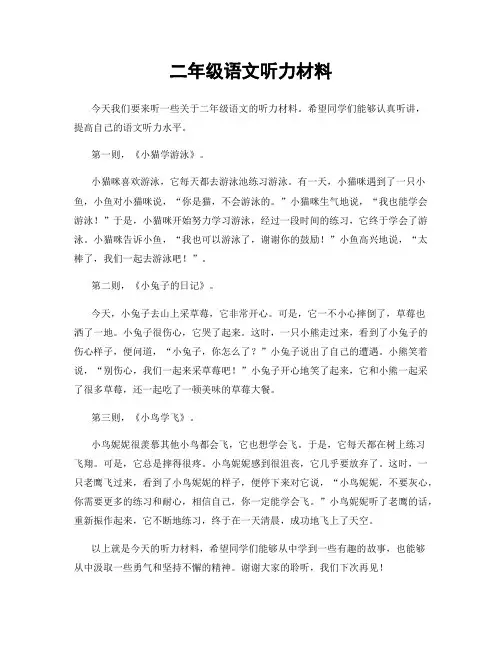
二年级语文听力材料今天我们要来听一些关于二年级语文的听力材料。
希望同学们能够认真听讲,提高自己的语文听力水平。
第一则,《小猫学游泳》。
小猫咪喜欢游泳,它每天都去游泳池练习游泳。
有一天,小猫咪遇到了一只小鱼,小鱼对小猫咪说,“你是猫,不会游泳的。
”小猫咪生气地说,“我也能学会游泳!”于是,小猫咪开始努力学习游泳,经过一段时间的练习,它终于学会了游泳。
小猫咪告诉小鱼,“我也可以游泳了,谢谢你的鼓励!”小鱼高兴地说,“太棒了,我们一起去游泳吧!”。
第二则,《小兔子的日记》。
今天,小兔子去山上采草莓,它非常开心。
可是,它一不小心摔倒了,草莓也洒了一地。
小兔子很伤心,它哭了起来。
这时,一只小熊走过来,看到了小兔子的伤心样子,便问道,“小兔子,你怎么了?”小兔子说出了自己的遭遇。
小熊笑着说,“别伤心,我们一起来采草莓吧!”小兔子开心地笑了起来,它和小熊一起采了很多草莓,还一起吃了一顿美味的草莓大餐。
第三则,《小鸟学飞》。
小鸟妮妮很羡慕其他小鸟都会飞,它也想学会飞。
于是,它每天都在树上练习飞翔。
可是,它总是摔得很疼。
小鸟妮妮感到很沮丧,它几乎要放弃了。
这时,一只老鹰飞过来,看到了小鸟妮妮的样子,便停下来对它说,“小鸟妮妮,不要灰心,你需要更多的练习和耐心,相信自己,你一定能学会飞。
”小鸟妮妮听了老鹰的话,重新振作起来,它不断地练习,终于在一天清晨,成功地飞上了天空。
以上就是今天的听力材料,希望同学们能够从中学到一些有趣的故事,也能够从中汲取一些勇气和坚持不懈的精神。
谢谢大家的聆听,我们下次再见!。

2008学年第一学期高一教学质量监测试题英语听力录音材料这是2008学年第一学期高一年级期末调研考试英语科听力部分。
该部分分为听力理解、听取信息两节。
注意,做题时,先在试卷上作答。
录音播完后,请在两分钟内将试卷上的答案转移到客观题答题卡上。
第一节听力理解听独白或对话听下面5段对话或独白。
每段对话或独白后有几个小题,从题中所给的A、B、C三个选项中选出最佳选项,并标在试卷的相应位置。
听每段对话或独白前,你将有时间阅读各小题,每小题5秒钟;听完后,各个小题将给出5秒钟的作答时间。
每段对话或独白读两遍。
听第1段对话,回答第1至第2两个小题。
现在,你有10秒钟的时间阅读这两个小题。
停顿00’10’’(停顿时间打点)(Text 1)W: Would you like to have something to drink?M: Yes. I’d love to have some beer.W: Do you like it with ice or without ice?M: Without ice. I don’t want to spoil the taste.W: Here you are.M: Thanks. Oh, it’s very good beer.W: I’m glad you like it. By the way, what’s your plan for the summer holiday?M. I’ve no idea. Maybe I’ll go surfing with Jack.W: How about going surfing together?M: That’s a good idea.停顿00’02’’重复停顿00’10’’(停顿时间打点)听第2段对话,回答第3至第5三个小题。
现在,你有15秒钟的时间阅读这三个小题。
停顿00’15’’(停顿时间打点)(Text 2)W: I can’t sleep very well. Could I have some sleeping pills?M: Hm, why can’t you sleep?W: I don’t know really.M: Is anything worrying you?W: Well…perhaps…I’m working very hard…We’re very busy at the moment.M: Well, I don’t really like giving patients sleeping pills. Forget all about your work, and you’llhave a good sleep. You must have a good rest…forget all about work. If you can’t sleep, havea hot bath before you go to bed, and then read a boring book. Don’t choose a book that’s veryexciting. Don’t drink coffee…W: Oh, but I like a drink before I go to bed.M: OK, have a glass of milk. Have some fruit or bread---but don’t have a big meal in the evening.停顿00’02’’重复停顿00’15’’(停顿时间打点)听第3段对话,回答第6至第8三个小题。

七年级英语试卷听力文字材料第一节(共10小题,每小题1分)听下面10段短对话,每段对话后有一个小题,从题中A、B、C三个选项中选出最佳选项。
每段对话读两遍。
听第1至10段材料,回答第1至10题。
1.M: Do you that man, Tom? He is very famous in our city.W: Yes, he is my uncle. He is a doctor.2.M: Wendy, what does your pet look like?W: She has four white paws and a black and white tail. She likes eating fish.3.M: Do you have to work tomorrow?W: No, I never go to work on Saturdays.4.M: Shall we have fish for dinner tonight?W: That’s my favorite.5 . M: Don’t feed the parrot, Xiao Xue.W: No, I just want to wash the cage.6 . M: Are you prac ticing speaking English, Mary?W: No. I’ m writing a letter to my friend.7. M: Amy, your pet dog looks so lovely and strong.W: Of course, I walk my dog once a day.8.M: What are the workers doing?W: They are having a rest because they are too tired.9. M: Helen, which subject do you like best? Math, Geography orComputer studies.W: Math isn’t easy to learn, my favorite subject is Geography.10.M: Mike is tall. Jim is taller than Mike, but Nike is shorter thanMike.W: Oh, of the three boys, Jim is the tallest and Nike is the shortest. 第二节(共10小题,每小题1分)听下面3段对话和短文,每段对话和短文后有几个小题,从题中A、B、C三个选项中选出最佳选项。
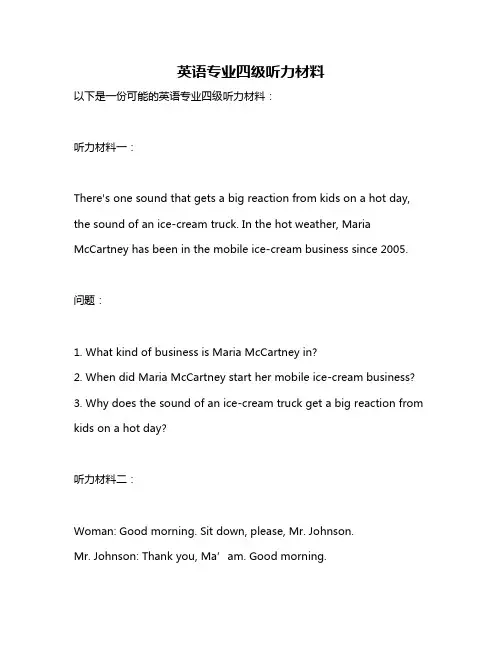
英语专业四级听力材料以下是一份可能的英语专业四级听力材料:听力材料一:There's one sound that gets a big reaction from kids on a hot day, the sound of an ice-cream truck. In the hot weather, Maria McCartney has been in the mobile ice-cream business since 2005.问题:1. What kind of business is Maria McCartney in?2. When did Maria McCartney start her mobile ice-cream business?3. Why does the sound of an ice-cream truck get a big reaction from kids on a hot day?听力材料二:Woman: Good morning. Sit down, please, Mr. Johnson.Mr. Johnson: Thank you, Ma’am. Good morning.Conversation Two: Woman: Excuse me. Could I ask you some questions?Woman: I work for an advertising agency, and I’m doing some research. It’s for a new magazine for people like you.Man: OK. Man: En… Twice a week, three t imes a week?Man: Parcel Express, Good morning. How can I help you?问题:1. What does the woman want to ask the man?2. Who does the woman work for?3. What is the man's response to the woman's questions?。
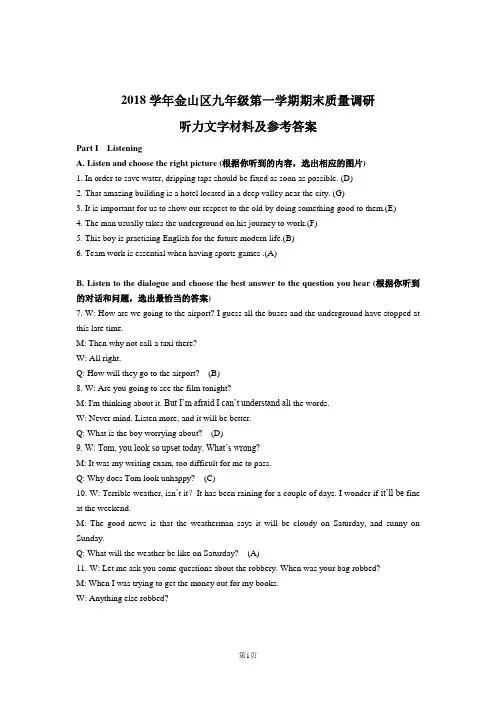
2018学年金山区九年级第一学期期末质量调研听力文字材料及参考答案Part I ListeningA. Listen and choose the right picture (根据你听到的内容,选出相应的图片)1. In order to save water, dripping taps should be fixed as soon as possible. (D)2. That amazing building is a hotel located in a deep valley near the city. (G)3. It is important for us to show our respect to the old by doing something good to them.(E)4. The man usually takes the underground on his journey to work.(F)5. This boy is practising English for the future modern life.(B)6. Team work is essential when having sports games .(A)B. Listen to the dialogue and choose the best answer to the question you hear (根据你听到的对话和问题,选出最恰当的答案)7. W: How are we going to the airport? I guess all the buses and the underground have stopped at this late time.M: Then why not call a taxi there?W: All right.Q: How will they go to the airport? (B)8. W: Are you going to see the film tonight?M: I'm thinking about it. But I’m afraid I can’t understand al l the words.W: Never mind. Listen more, and it will be better.Q: What is the boy worrying about? (D)9. W: Tom, you look so upset today. What’s wrong?M: It was my writing exam, too difficult for me to pass.Q: Why does Tom look unhappy? (C)10. W: Terrible weather, isn’t it?It has been raining for a couple of days. I wonder if it’ll be fine at the weekend.M: The good news is that the weatherman says it will be cloudy on Saturday, and sunny on Sunday.Q: What will the weather be like on Saturday? (A)11. W: Let me ask you some questions about the robbery. When was your bag robbed?M: When I was trying to get the money out for my books.W: Anything else robbed?M: Yes, some cards.Q: What job does the woman probably do? (B)12. W: Winter holidays are coming. Shall we go to visit Britain?M: Well, going to Britain takes many days, and I don’t think the holidays will be that long. I think we can go to Japan instead.Q: What are the two speakers talking about? (C)13. W: Do you do the housework at home, Tom?M: Doing housewor k? Don’t you think it’s the parents’ duty, Mary?W: Well, in my family, it’s the duty of all.Q: What does Mary mean? (B)14. W: I hope there will be a heavy snow this weekend so that we can play with snow.M: So do I, but I’ve just heard the weather forecast and it’s not good at all.W: What’s the matter? Is it going to rain?M: Worse than that. I t’s going to be sunny, so there won’t be any snow!Q: What can we learn from the dialogue? (A)C. Listen to the passage and tell whether the following statements are true or false (判断下列句子是否符合你听到的短文内容, 符合的用“T”表示,不符合的用“F”表示)One day in December, a man from Italy called Mario, was going home in his car. He stopped at a big store to buy some Christmas presents for his family. While he was there, he also went to the supermarket. He bought some nice food for supper. He came out of the shop and put the presents and food in the back of his car. Then he went to visit a friend who lived round the corner. He wished him Merry Christmas. He stayed with his friend for about an hour. It started getting dark so he decided to go home.As he was driving home, he got a flat tyre. He was not very good at changing tyres. Luckily, another man stopped and offered to change the tyre. Mario was pleased that someone helped him! The man told Mario to get in the car because it was raining a lot. He said he would change the tyre for him. The man, who seemed really friendly and helpful took the flat tyre off. Then he put the good tyre on. Mario thanked the man. The man said goodbye and got in his car and left. When Mario arrived home, he went to get the presents. That was when he discovered the man was a thief. Everything including the old tyre, the Christmas presents and the food were not there except a ticket. Mario didn’t collect the prize money with the ticket. He put an advertisement in the newspaper, asking the thief to come and get the ticket. The thief went to see Mario and got theticket back. Then he went to collect the prize money. Why did Mario return the ticket to the thief? “Well”, he said, "He might be a thief but I am not.”15. T 16. T 17. F 18. F 19. T 20. FD. Listen to the passage and complete the table (听短文,完成下列内容。
初二年级英语听力材料以下是一段初二年级的英语听力材料,供您参考:听力材料:Woman: Hello, can I help you?Man: Yes, I'm looking for a pair of running shoes.Woman: OK, we have a variety of styles and sizes. What size do you wear?Man: I wear a size 9.Woman: Great, we have several options in that size. Do you have a preference for a specific color?Man: I prefer black.Woman: Excellent, we have a few black running shoes. Would you like to try them on?Man: Yes, please.(Man tries on the shoes)Man: These shoes feel comfortable. How much are they?Woman: They are $80.Man: That's a bit expensive. Do you have any discounts?Woman: We have a 10% discount for our regular customers. Do you have a membership?Man: No, I don't.Woman: You can become a member for $20 and get the discount. Would you like to do that?Man: Yes, I'll become a member.Woman: Thank you. The shoes come down to $72 with the discount. Would you like to pay by cash or card?。
听力测试文字材料一根据你所听到的对话选择正确答案:(两遍)1. W: Hi, Nick, where is our dog Spotty, is it behind the door?M: No, he’s not there. Look, he’s under the chair.2. M: Mary, do you know ABCPark?W: Yes, there are many trees and flowers in it. But there is no lake.3. W: Nick, look at the girl beside the tree, is she Ann?M: Oh, that’s my new classmate, Lily. Ann is not at school today.4. M: Good afternoon, Miss Zhang, is there a poster on the wall?W: Yes, there is one on this wall. And look at that w all, there’s a new one over there.5. W: Tony, what is your mother, is she a teacher?M: No, my mother isn’t a teacher, she is a nurse.6. W: Do you have a puter lesson every day, Simon?M: Er, we have four puter lessons every week, and we have three art lessons a week. But we only have two music lessons a week.7. M: Mary, do you often go shopping on Sundays?W: On Sundays, my mother often goes shopping, and I often go to the bookshop with my classmates. Sometimes I read books at home.8. W: Tom, it’s your birthday next Saturday. Would you like a radio, or a basketball?M: A radio, a basketball? No, I would like an MP3 this year.9. M: Linda, where do you often have lunch, at home or at school?W: I often have lunch at school with my classmates, but on Saturday and Sunday I have lunch at home.10.W: Do you like watching TV, Steven?M: Yes, I enjoy watching TV, I often watch from seven thirty to nine thirty, then I go to bed.二根据你所听到的短文选择正确答案:(两遍)Mr Hu is our English teacher. He likes to tell us about his weekends. He often gets up at seven on Sundays. He has breakfast first. Then he goes to the park near his home. He runs for about half an hour in the park. Then he goes to the bookshop to have a look at new books. He likes to read books. In the afternoon, he cleans his car. But sometimes, he visits his friends. And he often plays basketball with his friends. He cooks dinner at home. In the evening, he looks for things on the Internet for about two hours. He enjoys his weekends.三根据所听短文内容填入所缺单词:(三遍)It’s Saturday today. It’s Betty’s birthday. She wears a new white T-shirt and a pair of blue jeans. She looks cool! There are some drinks and food on the table. Her friends have a lot of presents for her-hair clips, CDs, ic books and some stickers. She is very happy. All the friends enjoy the party. Some of them talk about interesting films. Some sit on the sofa andchat with each other, and some boys play puter games in the room. At last all her friends walk to her and sing ‘Happy birthday’ to her. Then they share the big birthday cake with her. Betty has a nice birthday and all her friends have a good time.。
初中英语听读训练听力材料以下是一份初中英语听读训练听力材料,供您参考:Title: The Secret of SuccessHello, everyone! Today, I want to share with you the secret of success. Success is something that everyone wants, but not everyone can achieve it. The key to success is hard work, but there is more to it than that.Firstly, you need to have a dream. A dream is what drives you to achieve your goals. It is what gives you direction and purpose. Without a dream, you are like a ship without a sail, drifting aimlessly on the sea.Secondly, you need to believe in yourself. Believing in yourself means having confidence in your abilities and your decisions. When you believe in yourself, you are more likely to take risks and try new things.Thirdly, you need to be persistent. Persistence is the ability to keep going despite difficulties and failures. It is about never giving up and always looking for ways to improve. Persistence is the key to overcoming obstacles and achieving success.Finally, you need to learn from your mistakes. Failure is a natural part of success. It is only by making mistakes that we can learn and improve. When you make a mistake, don't be afraid to admit it and learn from it. Failure is not a weakness, but a stepping stone to success.In conclusion, success is not easy. It takes hard work, belief, persistence, and learning from mistakes. But if you have these qualities and are willing to put in the effort, you can achieve anything you set your mind to. Remember, success is not final, failure is not fatal, it is the courage to continue that counts.希望这份材料对您的初中英语听读训练有所帮助。
2023年3月英语六级听力原文一、场景介绍本次英语六级听力考试将包含多个场景,涉及日常生活、学术讨论、商务交流等多个领域。
听力原文将通过文字呈现,学生可以在网上或纸质材料上阅读。
二、日常生活场景对话1. Student: Hey, John, have you finished the assignment for history class?John: Oh, Ipletely forgot about it. When is it due?2. Receptionist: Good morning, how may I help you?Client: I have a reservation under the name of Jane Smith. Receptionist: Let me check. Yes, here it is. How many nights will you be staying with us?3. Friend 1: How was your trip to Japan?Friend 2: It was amazing. The food, the sights, and the people were all incredible.Friend 1: I'm so envious. I've always wanted to go there.4. W本人ter: Are you ready to order?Customer: Yes, I'd like the grilled salmon with steamed vegetables, please.W本人ter: And for your drink?Customer: I'll have a glass of white wine, thank you.三、学术讨论场景对话1. Professor: Today, we will be discussing the impact of climate change on marine ecosystems. Please turn to page 45 of your textbook.2. Researcher 1: Our findings show a correlation between sleep patterns and academic performance.Researcher 2: That's fascinating. It may lead to new strategies for improving student success.3. Presenter: Our research team has been investigating the effects of social media on mental health. Our results demonstrate a significant link between excessive social media use and depression.Audience member: Do you believe this is a causation or simply a correlation?4. Student: I'm struggling to understand this concept. Could you expl本人n it in a different way?Classmate: Of course, let me break it down for you.四、商务交流场景对话1. Manager: Our sales numbers have been declining. We need to br本人nstorm new marketing strategies.Marketing Director: I suggest targeting a younger demographic through social media camp本人gns.2. Employee: I have a proposal for a new project that could potentially increase our profits.CEO: I'm open to hearing your ideas. Please present your proposal at the next board meeting.3. Negotiator 1: Our offer is non-negotiable. Take it or leave it. Negotiator 2: We need more time to review the terms. Can we reconvene tomorrow to continue the discussions?4. Team Leader: We have a tight deadline to meet. Let's organize a meeting to delegate tasks and establish a timeline. Team Member: I agree. We need to work efficiently toplete this project on time.五、总结本次英语六级听力原文涵盖了日常生活、学术讨论和商务交流等多个场景,在各种生活情境听力的练习中,考生需要灵活运用英语知识和语境推理能力。
二上英语听力材料以下是二年级英语听力材料,供您参考:1. 数字:让学生听数字,如“one, two, three, four, five”等,然后让学生说出听到的是哪个数字。
2. 颜色:让学生听颜色名称,如“red, blue, green, yellow, purple”等,然后让学生说出听到的是哪个颜色。
3. 动物:让学生听动物名称,如“cat, dog, rabbit, bear, elephant”等,然后让学生说出听到的是哪种动物。
4. 水果:让学生听水果名称,如“apple, banana, orange, pear, peach”等,然后让学生说出听到的是哪种水果。
5. 日常用品:让学生听日常用品名称,如“pen, pencil, ruler, book, bag”等,然后让学生说出听到的是哪种日常用品。
6. 人物:让学生听人物名称,如“grandpa, grandma, father, mother, brother”等,然后让学生说出听到的是哪位人物。
7. 地点:让学生听地点名称,如“school, park, zoo, library, cinema”等,然后让学生说出听到的是哪个地点。
8. 食物:让学生听食物名称,如“pizza, hamburger, french fries, hot dog, cake”等,然后让学生说出听到的是哪种食物。
9. 方位:让学生听方位词,如“left, right, up, down”等,然后让学生指出对应的方向。
10. 时间:让学生听时间名称,如“morning, afternoon, evening, night”等,然后让学生说出听到的是哪个时间段。
以上听力材料可根据学生的实际情况进行选择和调整。
九年级英语听力材料As a ninth-grade English teacher, it is important to provide students with high-quality listening materials to help improve their listening skills. Here are some sample listening materials that can be used in the classroom.Listening Material 1: Interview with a Famous Celebrity。
In this listening material, students will have the opportunity to listen to an interview with a famous celebrity. The interview will cover topics such as the celebrity's career, personal life, and upcoming projects. Students will be asked to listen for specific information and answer comprehension questions based on the interview.Listening Material 2: News Report on Current Events。
This listening material will present a news report on a current event, such as a natural disaster, political development, or scientific breakthrough. Students will be required to listen for key details and important information, and then discuss the implications of the news report in small groups or with a partner.Listening Material 3: Dialogue Between Two Friends。
2011级2012年4月大学英语(二)期中考试试卷听力文本Short conversations1. M: Nice weather, isn’t it? Oh, I’ve seen you around in the Students Union, but I don’t think we’ve met. I am Henry Smith. I am in the Drama Society.W: Nice to meet you, Henry. I am Helen Grant. I play for the orchestra.Q: What can we infer from the conversation?2.none3. M: Christmas is round the corner and I’m looking for a gift for my girlfriend. Any suggestions? W: Well, you have to tell me something about your girlfriend first. Also, what’s yo ur budget?Q: What does the woman want the man to do?4. none5. M: Ma’am, I hear you have an apartment for rent. Can I take a look at it?W: Sure, you’re welcome any time by appointment, but I have to tell you the building is close to a railway. And if you can’t put up with the noise, you might as well save the trip.Q: What do we learn from the conversation?6. none7. M: I think the hostess really went out of her way to make the party a success.W: Yes, the food and drinks were great, but if only we had known a few of the other guests.Q: What did the two speakers say about the party?8. none9. M: Do we have to get the opera tickets in advance?W: Certainly! Tickets at the door are usually sold at a higher price.Q: What does the woman imply?10. W: I’ve been waiting here almost half an hour! How come it took you so long?M: Sorry, honey! I had to drive two blocks before I spotted a place to park the car.Q: What do we learn from the conversation?11. M: What would you like for dessert? I think I’ll have apple pie and ice cream.W: The chocolate cake looks great, but I have to watch my weight. You go ahead and get yours. Q: What will the woman most probably do?12. M: How’s John now? Is he feeling any better?W: Not yet. It still seems impossible to make him smile. Talking to him is really difficult, and he gets upset easily over little things.Q: What do we learn about John?13. M: The taxi driver must have been speeding.W: Well, not really! He crashed into the tree because he was trying not to hit a box that had fallen off the truck ahead of him.Q: What do we learn about the taxi driver?14. M: What was it like working with those young stars?W: It was a great group. I always got mad when people said that we didn’t get along just b ecause we’re girls. There was never a fight. We had a great time.Q: What does the woman mean?15. M: Are you telling me you don’t have a housekeeper?W: No, we don’t. If you make a mess, you clean up yourself.Q: What do we learn from this conversation?Long conversationsConversation 1M: Come in please! What can I do for you?W: Prof Tomalin, are you giving your Advanced Geology course next semester?M: Yes, I’m planning on it.W: Could I enroll in it? I know it’s a graduate course and I’m only a junior, but…M: Aren’t you a bit young? I’ve allowed qualified seniors to take the course and they usually have a hard time keeping up.W: I know. But the geology of the American West is my favorite and I’ve done a lot of reading in the field. Last semester I took Prof Burman’s course and I didn’t find it nearly challenging enough. M: I see. You certainly aren’t one of those students who are out for easy grades.W: I should say not. I really want to learn something.M: Well, I’ll speak to Prof Burman. If he thinks you’re ready, I’ll let you enroll.W: Oh, thanks, Professor Tomalin. That’s really very kind of you.16. Why did the woman talk to the professor?17. At what stage is the woman in her studies?18. What is the professor’s first reply to the woman’s request?19. What does the woman say to persuade the professor?20. What does the professor promise to do?Passage 1As the competition in the modern world is more and more fierce, the pressure from education, career, or family is more and more severe, so it is essential to keep a good mood to confront all kinds of circumstances.Nowadays depression can lead to death. That is no longer a piece of news. A bad mood can cause psychological disease, affect the health of the human body, and influence the process of studying and working; or even worse, the sufferer can not lead a normal life like other people.While a good mood often brings health, it is more important because it guarantees high efficiency at work. What’s more, if you are in a good mood, your h umor and enthusiasm will have an effect on the people around you, thus a harmonious, pleasant atmosphere is established, and the efficiency of the group is also enhanced.It is important and necessary for us to keep a good mood to avoid the consequences of bad moods and make full use of the merits of good moods.21. What is not mentioned in the passage?22. What consequence does a bad mood lead to?23. What benefits does a good mood bring to us?Passage 2If you're wondering where the man of the house has got to, he's probably on the phone. Men have changed places with women as the family chatterbox, a survey has found. They dominate the house phone as well as constantly chatting on their mobiles.The average man is on the phone for 32 minutes a day, up from 22 five years ago. Women, on the other hand, spend a daily average of 26 minutes on the phone, down from 35 in 2002.But it's not because they suddenly have less to say. Women appear to prefer to share their gossip using e-mail and text messages, said the study of 3,500 adults.Calling banks or insurance companies, buying tickets and booking restaurant tables were includedin the conversations used to calculate the time spent on the phone. Work calls, however, were not.Almost 29 per cent of men said that sport was their favorite topic, followed by 22 per cent who discussed the mysteries of women and 20 per cent the even greater mysteries of money.A third of women (32 per cent) said they chatted most about men. A similar number said what and what not to wear was their main topic of conversation. Other top subjects were mutual friends and making plans to socialize.24. What is the passage mainly about?25. Why do women no longer dominate the house phone?26. How many men take money as their favorite topic on the phone?Passage 3Unhappy people glue themselves to the television 30 per cent more than happy people.The finding, announced on Thursday, comes from a survey of nearly 30,000 American adults conducted between 1975 and 2006 as part of the General Social Survey.While happy people report watching an average of 19 hours of television per week, unhappy people report 25 hours a week. The results hold even after taking into account education, income, age and marital status.In addition, happy individuals are more socially active, attend more religious services, vote more and read a newspaper more often than their less-chipper counterparts.The researchers are not sure, though, whether unhappiness leads to more television-watching or more viewing leads to unhappiness.In fact, people say they like watching television: Past research has shown that when people watched television they enjoyed it. In the studies, participants reported that on a scale from 0 to 10, TV-watching was nearly an 8.But perhaps the high from watching television doesn't last. John Robinson, a sociologist at the University of Maryland, College Park, said, "These conflicting data suggest that TV may provide viewers with short-run pleasure, but at the expense of long-term happiness."The researchers suggest that over time, television-viewing could push out other activities that do have more lasting benefits. Exercise comes to mind, as do parties and other forms of socialization known to have psychological benefits.Or, maybe television is simply a refuge for people who are already unhappy.27. W hat is among the findings of the survey reported in the passage?28. H ow long does the survey last?29. W hich of the following statements is true according to the passage?30. W hat is not included in the activities that have lastingbenefits?。